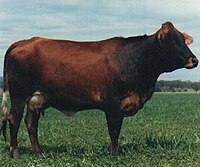
Photo from wikipedia
The objective of this experiment was to evaluate the effect of supplementing rumen-protected Lys based on a Lys-deficient diet on liver metabolism in growing Holstein heifers. The experiment was conducted… Click to show full abstract
The objective of this experiment was to evaluate the effect of supplementing rumen-protected Lys based on a Lys-deficient diet on liver metabolism in growing Holstein heifers. The experiment was conducted for 3 months with 36 Holstein heifers (initial body weight: 200 ± 9.0 kg; 7-month-old). Heifers were randomly assigned to 2 diets based on corn, soybean meal, alfalfa hay, and wheat bran: control, Lys-deficient diet (LD; 0.66% Lys in diet), and Lys-adequate diet (LA; 1.00% Lys in diet). The results showed no difference in growth performance between the 2 groups (P > 0.05). However, there was a clear trend of increasing feed conversion rate with Lys supplementation (0.05 < P < 0.01). The serum urea nitrogen concentration was significantly decreased, and the aspartate aminotransferase-to-alanine aminotransferase ratio was significantly decreased by Lys supplementation (P < 0.05). Moreover, growing heifers fed a Lys-adequate diet had lower levels of urine nitrogen excretion and higher levels of the biological value of nitrogen (P < 0.05). Metabolomic analysis revealed that 5 types of phosphatidylcholine and 3 types of ceramide were significantly increased and enriched in sphingolipid metabolism and glycerophospholipid metabolism (P < 0.05). His, Leu, and Asp levels were significantly decreased in the liver following Lys supplementation (P < 0.05). In conclusion, Lys supplementation may promote the synthesis of body tissue proteins, as evidenced by significantly decreased amino acids in the liver and urine N excretion, it also improves hepatic lipid metabolism by providing lipoprotein precursors.
Journal Title: Animal Nutrition
Year Published: 2021
Link to full text (if available)
Share on Social Media: Sign Up to like & get
recommendations!